on doubt
Somewhere in my reptilian brain, I remembered that training was different from anything else I've ever experienced. I can maybe compare the intensity of it to the birth of my first child, which was forty-two hours of sweaty want, or maybe the weeks when I was co-directing the musical, so my days at school went from seven in the morning to nearing midnight at times. I only compare to these things because of the intensity: the metaphorical marathon we put our intellectual and physical bodies through to get to the other end of a thing. The end results are gorgeous: students learning, a dazzling performance over two weekends, a baby! A certificate that somehow qualifies this gal to teach Montessori style to dozens, perhaps hundreds, of children.
I had completely forgotten exactly what that metaphorical marathon felt like, and maybe that's why people are able to have babies again: we forget, not the facts, or even the emotions, but there is something that we drop between one summer and another, what it actually means to be in the midst of the thing. To come home on the first day and fall asleep on the sofa within minutes, even when all you really want is to hold your children and smell their heads and kiss their warm cheeks. Or at least make dinner for the woman who has been watching them all day.
And in those first three days, I felt a kind of misery that had started a few weeks prior, a kind of niggling doubt that was burrowing into my awful brain, and I thought frantic thoughts: What am I doing? I miss teaching English--should I be teaching English again? I'm scared at what is happening to public education, and my friend talked about being on the front lines--am I in the back? Am I playing it safe? Should I be a better advocate? Am I doing a disservice to these students? (Also: Help me, the sheer amount of math presentations is destroying my sanity.)
I asked myself: If I am so unhappy with this, why am I doing it to myself?
I talked to my husband about it, about the despair I was feeling, the self-doubt. I kept asking, Am I having a grass-is-greener moment?
In all honesty, I have the same kinds of hamster-spinning-wheel thoughts about eleventy billion different things in my life: I will vacillate between intense fiber projects and wanting to read every book in my library. When I started training to be an English teacher, I couldn't put my finger on my favorite sub-discipline: was it speech or writing or reading? I admired it all, but which one was my love? Which would I specialize in? When I got my MFA, I wobbled between prose and poetry.
(I especially love the lyric essay, which is the best of both worlds. I love that my mind and my craft could come to this conclusion, even if the rest of my divergences cannot cooperate as well. Though I have to admit, I hope to one day find the time to work on combining the written word with fiber--I also love book arts, the book as a physical object, letterpress, the like, though at a center for book arts, there are tracks as well--papermaking, bookbinding, letterpress, so even there I cannot win. Embroidering essays on paper I've made from trees that we've grown?)
As a result, I often become a master of none.
For instance, I have taught, in order: middle school, high school, gifted and talented early high schoolers, undergraduates, late elementary in workshop, adults in workshop, and here I am. Ages six through twelve. The whole fat swath of elementary.
Last night, I was just writhing in this misery: the sheer amount of work we have been doing in training and the woe of simply keeping up with my daily tasks.
But as I was trudging up the stairs to prepare the kids for bed, my eye caught on this book.
And I began to remember: oh yes, I want to read with upper elementary students from this book. I want to talk about folktales, about so many folktales, and about what stories we tell in our own families over and over again. I want to talk about pattern and the breaking of patterns, of how we set the reader up and what we do with that. I tingled thinking about it.
And just like that, those niggling self-doubts began to melt. This is how so many of my own turnovers occur: a glimpse of a book, a remembrance. Yes, that literature meant so much, or that literature has this potential, and then I'm swept. I want to read this book this summer and come back in the fall with folktales to share with my people.
I was not raised in a household of religion. I was raised in a household of stories, of narrative. I was told stories from the Bible and Shakespeare as bathtime and bedtime stories. My father taught the Bible as Lit, and has been a composition and literature professor for a zillion years. One of my clearest memories from my elementary years was riding in my parents' minivan from Chattanooga to Massachusetts, talking to my mother as my sister slept in the back, about the vastness of the universe. Everything became a story.
For me, my faith is made of two things: language and education. Outside of the myriad quirks, such as our menagerie (which partly speaks to my daughter's main passion more than my own) or my closet of fiber, these are the two subjects on which my heart will always pound, and I'll probably always have an opinion, right or less than right. It's also the arena in which I want to share the most: you want a book recommendation? It's yours. You want to talk about a lesson plan idea? I'd love to.
Because I knew one of these passions so early on--that of the word (I would say literature, but oh how I admire it when it's spoken too, and there is so much to admire of the spoken word, storytelling, a fantastic speech that moves us from our seats and our selves)--I am honored to be able to be involved in other peoples' journeys finding their own passions. This is what teaching can be. And how we connect these passions to all of the cosmos.
In Montessori, I get to be the teacher I've always wanted to be: I get to connect with each child individually, not because public school doesn't want me to, but because it cannot afford to give me the time. I get to really assure a child's learning because the curriculum moves with the child. There is no single "learning target" on the board, no standardized test. We can make connections across disciplines--and when research is done, the child can decide how to transmit that knowledge to others in the room. There's no one answer. We are meant to wonder, to make inquiry. We can follow the child.
With any good faith, we slip, we have doubts. To me, my mantra is always: Am I doing right by my students? This is my constant way of measuring my choices. Am I honoring their ways of learning? The communities from which they come and the community we are forming?
We're about a month into our time apart, and I miss them fiercely.
I don't always align with Montessori, or at least the ways in which our training center seems to interpret her teachings, and I'll write about those down the line. But for now, my doubt has faded, and I am filled with gratitude. I'm glad to doubt once in a while: we're able to come back with more assurance and faith. We're able to feel stronger as we move forward. And I move forward.
I dream about bead bars at night and I move forward.




Comments
Post a Comment